- Home
- E. E. Knight
Winter Duty Page 3
Winter Duty Read online
Page 3
Four enervating days later Valentine had his wounded across the Mississippi. The Kentucky worm drivers turned homeward, their sluggish mounts willing to move only in the warmest hours of the day no matter how much pain they inflicted with the long, sharp goads.
The Kentuckians would stay on their side of the river. Valentine felt guilty saying good-bye and wishing them luck, they’d pushed their worms on through the cold until death was assured for their mounts. Without a group of others of their kind to coil with, in a knitted cocoon to protect the fall’s eggs, the frost would take them like delicate fruit.
“These two are goners, I think,” Dorian said as they made their good-byes. He’d been quiet ever since shooting six of Blitty Easy’s Crew on that wild, clear night.
“We’ll compensate you and your father somehow,” Valentine said, signing an order and tearing it off from his dwindling sheaf of blanks.
“Wish they could give me back that night. The one with the shooting.”
Valentine felt for the young man. Dorian had stepped across a terrible threshold far too young.
“You followed orders and did what had to be done, Dorian,” Valentine said. “Better than thirty people are going to live to a fine old age because you’re a good shot. Remember that.”
The youth nodded dumbly, and his father nudged him back toward the high saddles.
Duvalier embraced him with one of her characteristic hugs, half handshake and half lover’s embrace. She nuzzled the bristle on his chin.
“I’ll see that they get back all right. Any orders for me back in Henderson?”
“Be careful. I think if the Kurians move on us, it’ll be from the Ordnance. You could check the rail lines up that way.”
“Can do,” she said.
“I won’t be gone long. I’m just going to give my report, see about supply and replacement, and return.”
She slipped away as though bored with the good-bye, and Valentine returned to supervising the river embarkation.
Javelin had left Southern Command with bands playing and people cheering and tinfoil on their heads.
Its wounded returned under cover of darkness, hauled across the Mississippi in some of Southern Command’s Skeeter Fleet—twin-engined outboards ready to make wake at the first sign of trouble.
No crowds met them on the western shores, just a deputation from Forward Operating Base Rally’s commander at the edge of the Missouri bootheel.
Colonel Pizzaro looked incredulous when Valentine announced that he’d been returned with fresh from a hard-fought victory in Western Kentucky. Valentine handed over a sealed report to Southern Command from Colonel Bloom, now in command of what was left of the expedition to the Appalachians.
“Don’t be stingy with the steaks and beer,” Valentine said. “They walked a hard trail. They deserve a few luxuries with their laurels.”
Pizzaro cleared his throat. “Tell me, Valentine. Don’t hold back. How bad was it over there? Papers are playing it down or calling it a catastrophe.”
“Could have gone better,” Valentine said. “But it wasn’t a disaster. We’ve gained allies, just not where we expected. I’d call it a major victory for the Cause.”
“He’s a good man, but kind of an oddball,” one of Pizzaro’s staff said to a corporal in a voice he probably thought too quiet for Valentine to hear. “Always full of fancy ideas about working with Grogs and stuff.”
Pizzaro snorted. “Victory? Not according to the Clarion headlines. Or are you aiming for a nice long rest somewhere quiet with lots of watercolor paint?”
“It was a win for the good guys, Colonel.”
“You’re selling that at headquarters?” Pizzaro asked. “I wish you luck.”
CHAPTER TWO
Southern Command Mississippi Operational Area Headquarters, the second week of November: The architects who designed the Mall at Turtle Creek in Jonesboro would still recognize their structure, though they’d be surprised to see some of the renovations caused by war and necessity.
One of the anchor stores has been hollowed out and turned into a vast machine shop for the repair and renovation of valuable electronics, and the rest of the big box stores serve as warehousing. The smaller shops have been converted to training classrooms, meeting areas, offices, break rooms, a medical center with a pharmacy, even a kennel for the bomb sniffers and guard dogs. Only the food court is still more or less recognizable; if anything, it is a little more interesting, thanks to cases displaying unit histories, photographs, and citations. And some of the hardy palms planted inside by the builders have survived the mall’s looting, deterioration, and restoration.
Most of the exterior doors have been welded shut, of course, and netting and silent antiaircraft guns dot the roof. Barbed wire encircles the parking lots scattered with buses, trucks, and staff four-wheelers and motorcycles ready for use and dispatch.
Of course, the polished floors are patched and the ceilings are being rebuilt in some areas to repair minor earthquake damage the mall received in 2022.
David Valentine, having passed through the security station and visitors’ lobby taking up the old bookstore, idles with a yellowed copy of French military history on an upholstered chair that smells like cigars and mildew and body odor, his thumb smeared with ink for an ID record and his bad leg stretched out where it won’t interfere with passersby. He had enough pocket money for a bagel and a glass of sweet tea at the little café for visitors waiting to be met.
He fights off a yawn as he waits.
On the other side of the old store, security staff search and inspect those passing in and out of the headquarters, not a yawn to be seen. The Kurians have their own versions of Cats.
The ink had dried and the last crumbs of the bagel disappeared by the time General Lehman’s adjutant appeared. The staffer might have been a living mannequin of crisp cotton and twill. Valentine felt scruffy shaking hands with him. All Valentine had managed in the washroom was to comb his hair out and wash his face and hands.
Perhaps it wasn’t the chair that was so odiferous after all.
“You can just take that book if you like,” the adjutant suggested. “It’s all Southern Command library. I’m sure you know where to drop it.”
“Thanks for the tip,” Valentine said. Not that he needed it. He’d visited the quiet library and reading room in one of the mall’s old stores to unwind after the quick debriefing he’d undergone on his arrival yesterday afternoon. Three paperbacks, one with a duct-tape spine—the illustration of the dripping-wet bikini girl on the cover reaching up to undo her top did wonders for circulation—were already stuffed into his duty bag beneath the reports and Javelin correspondence.
They’d talked about Javelin, good and bad. When Valentine gave them his assessment for the addition of Kentucky to the United Free Republics, his interviewers had exchanged a look that didn’t strike Valentine as promising.
And he hadn’t even begun to describe what he had in mind for his Quisling recruits.
He saved that for the end, and they told him to take it up with General Lehman the next day.
There was another wait outside Lehman’s office, and Valentine switched to American history, a biography of Theodore Roosevelt. He was experiencing the Badlands with Roosevelt after the nearly simultaneous deaths of his mother and wife when Lehman’s staffer summoned him.
When Valentine finally stood before the general in command of the eastern defenses, he was surprised to see a pair of arm-brace crutches leaning against the desk and the general’s right leg encased in plaster and a Velcro ankle brace on the left.
“Bomb beneath my command truck,” Lehman said. “Flipped us like a flapjack.”
He looked paler than Valentine remembered, thin and strained.
“Let’s hear it, Valentine,” Lehman said. “Don’t spare me; I know I sent you out there.”
Lehman dipped his little silver comb in the water glass and commenced cleaning his drooping mustache in the methodical fashion a cat mig
ht use to clean its face. It was whiter and less bushy than it had been a year ago at the planning sessions for Javelin. Cover Lehman in dust and denim, and he’d pass for a cowhand straight off a Texas ranch, but he had precise, machinelike diction, weighing each vowel and consonant of his sometimes cracker-barrel phraseology. Valentine had heard that as a junior officer he’d been in signals, communicating with other Freeholds around the world.
“Should really make you a colonel, Valentine,” General Lehman said.
“What about the confirmation vote?” Southern Command was allowed to run its own affairs within the confines of its budget—and parts of it even made money by engaging in civil engineering projects or restoring machinery—but promotion to colonel and above had to be approved by the UFR’s legislature.
General Lehman nodded. “The Clarion would get in a huff and their chickens in the legislature would squawk in tune and the whole list would probably be voted down. They’ve had a field day over Javelin. You understand.”
“I do.”
“Of course, there’s no reason we can’t pay you like a colonel.”
“Under the assumed name,” Valentine said. Technically, David Valentine was a wanted man and couldn’t draw pay, civilian or military. Not that it would do him much good if the pay increase went through. Few colonels got rich, despite their pay-draws twice that of a major. A colonel was expected to spend most of it on entertainments for his command, and most also gave generously to families of the command who’d lost fathers or mothers. A private who was good at scouring arms and medical supplies and selling them back to the Logistics Commandoes could do better.
“There is one promotion I’d like you to make,” Valentine said. “I’d like Sergeant Patel—his name is all over those reports—made a captain.”
“Shouldn’t be a problem. I’ve heard the name. Wolf, right? Twenty years or more.”
Valentine noticed there were archival boxes all against the walls, and two locked file cabinets hung open.
“Moving to a new office, sir?” Valentine asked.
“That’s one way to put it. You didn’t hear about the election, then?”
Valentine didn’t follow politics when he was in the Free Republics, beyond what filtered in to mess hall chatter and newspaper articles.
“There’s been a change, as of the first week of November,” Lehman continued. “President Starpe lost. Adding Hal Steiner to the ticket didn’t help as much—”
“I’m sorry, General. Hal Steiner? From down south near the Louisiana border?”
“Yes. Of course, you’ve been out of the UFR. Sorry, it’s all anyone’s been talking about here. Steiner a friend of yours?”
“I met him as a lieutenant.”
“Yeah, he’s the one who helped keep all the Archangel forces hidden down in those swamps. The Concorde Party made a big deal about Steiner coming out of the KZ and treating Grogs like people, and between that and the bad news out of Kentucky and the Rio Grande, the New Federalists were plastered. Anyway, old DC is out and Thoroughgood is in. Once Lights’s sworn in, he’ll nominate Martinez to take over Southern Command, and I suspect the legislature will approve, though the Texas bloc will be voting against him, of course, because of the bad feelings about ’seventy-three.”
A piece of Valentine’s brain translated the political farrago.
Archangel, of course, was the operation that ousted Consul Solon and the Kurians from his brief hold on the Ozarks. In the chaos following, Southern Command seized much of Texas and Oklahoma and a patch of bled-dry Kansas.
The United Free Republics, after a messy birth, had divided into two parties, the Concorde and the New Federalists. Other than their slogans—Liberty and Justice through Thoroughgood for the Concorde, Starpe Can’t Be Stopped for the New Federalists—he didn’t know much about platforms and so on, though the perpetually dissatisfied Clarion supported Thoroughgood through its editorial page and its reporting.
“Old DC” was a nickname for President Starpe, not because of some connection to the old United States capital, but because he earned the nickname Danger Close as an artillery spotter during the tumultuous birth of the Ozark Free Territory. He’d infiltrate Kurian strongpoints and called in artillery fire literally on top of himself. His opponent, Zachary Thoroughgood, was a scion of the Thoroughgood family, owners of the Thoroughgood markets and a several hotels and casinos in Branson. They also controlled a brewery that produced a fine spruce-tip ale that Valentine’s old CO in Zulu company had been fond of as well.
Valentine had first heard of Thoroughgood as a prosecutor who busted up criminal gangs operating from the borderlands and then for improving electrification and water supply across the UFR as a legislator. Thoroughgood’s friends and constituents called him “Lights,” and Valentine had heard him called “Lights, Camera, Action” here and there, for he was famously photogenic and traveled everywhere with a photographer.
As to the “Texas bloc,” Valentine knew that in the legislature there were constant fights between the representatives from the old Ozark Free Territory and the newer regions. Rules of seniority favored legislators from the Missouri and Arkansas areas.
General Martinez, of course, was an old enemy. Valentine had put Martinez on trial for the murder of a pair of helpful Grogs who’d followed him up from the Caribbean. Valentine had always suspected Martinez had, if not an entire hand, at least a pointing finger in his own arrest after the fight in Dallas that led to his exile from the UFR.
Lehman got up and dug around in a pile of newsprint next to a bureau with liquor bottles lining their little rail like spectators. He tossed down a copy of the Clarion.
STARPE STOPPED, read the headline.
“I suspect there’ll be changes once Martinez takes over. I won’t be running the Mississippi front and parts east. All these boxes and such, they’re not me getting set to move out; they’re from the new broom coming in. There’s been a suggestion of malfeasance on my part over Javelin. Preservation of evidence and all that.”
“How could you know it was all a setup? They fooled Brother Mark.”
Lehman chuckled. “You’ve changed your opinion of him, then? Back when we were organizing Javelin, I got the impression he was a stone in your hoof.”
“He grows on you. Even the men are starting to confide in him. He’s like the grouchy instructor nobody likes but still remembers ten years later.”
“Soon I’ll be a memory here. If I don’t get retired, I imagine I’ll be checking locks on empty warehouses and filing reports on other reports that’ll end up going into my superior’s report. General Martinez and I don’t piss in the same direction on any number of things, starting with Kentucky. He penned an editorial for the Clarion about Javelin, Valentine. Of course, all the paragraphs featured the word ‘fiasco’ with the same arguments, but then the Clarion only has two tunes in their hymnal. Everyone around here’s tight as a turtle’s ass with the soup pot bubbling.”
“What are our chances of getting some reinforcements into Kentucky? Garrison and training duty, until they can get themselves organized.”
“Somewhere on the short block between Slim Street and None Boulevard, I’m afraid, Major.”
Valentine stood up. “Whatever’s being said about Javelin, it wasn’t for nothing. Kentucky’s come in on our side, more or less. The Moondaggers, the ones who bled Kansas dry, they’ve left bodies scattered from the Ohio to the Tennessee.”
“That was just the first wave, son. The signals and intelligence staff thinks something’s brewing in the Northwest Ordnance. Beyond the usual dance of reinforcements for the river crossings, with armed rebellion just across the river and over Evansville way.”
Valentine wondered about Evansville. Technically it had been the extreme southwestern tip of the Northwest Ordnance, which encompassed the old rust belt states of Ohio, Michigan, and much of northern and southern Indiana. (The central part of the state organized itself with the other great agricultural Kurian principalities in
Illinois south of Chicago.) “All the more reason to send us at least something. Without their legworms, the clans in Kentucky lose their mobility and flexibility.”
General Lehman leaned back in his chair, staring at the ceiling as he drummed his chest with his fingers. “Maybe they won’t have any more luck in those hills than we did.”
“A fresh brigade could make a big difference in western Kentucky. The old legworm clan alliance can take care of their ridges. With Evansville as a supply base, they have hospitals, fuel supplies, machine shops, factories. There’s even a company that produces tents and backpacks.”
“I hate half measures, Major. The way I see it, we either pull out completely or go all in and shove every chip we can scrape together across the Mississippi. I’d like to argue for the latter, but we’re in flux right now.”
“I’ve got an ad hoc battalion of Evansville volunteers—I guess you’d call them. There’s more than that in western and central Kentucky. We could put the brigade back together and have near a division.”
Lehman’s comb went to work again.
“But right now, in Evansville, all you have is what’s left of Javelin and your volunteers.”
“The Kentuckians chased down the Moondaggers before settling in for the winter. Their legworms have to hibernate, remember. But the Evansville volunteers have the know-how for mechanized operations.”
“Yes, the staff briefed me on that. You’re proposing a sort of French Foreign Legion for ex-Quislings, am I right? They do a little bleeding for us, and in six years they get a new name and citizenship in the UFR. Quite a scheme.”
“I realize I may have exceeded my authority in recruiting local support.”
“That’s what you were assigned to Javelin for: local support.”
“To hear you tell it, my locals won’t have anything to support much longer.”
“All in or pull out, Valentine. I’m sorry to say it, but all in is just not in the cards this year. That leaves pull out.”
“Can I at least get some matériel for my Quisling recruits? They’re walking around in black-dyed versions of their old uniforms and using captured Moondagger guns. Not the best of rifles—they’re mostly bolt-action carbines with low-capacity magazines. Fine for smoking out rebellious townies; not so hot when you’re trying to bring down a running Reaper.”

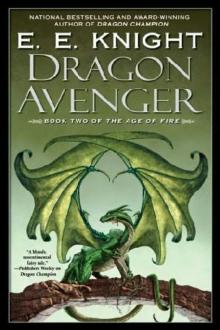 Dragon Avenger
Dragon Avenger Daughter of the Serpentine
Daughter of the Serpentine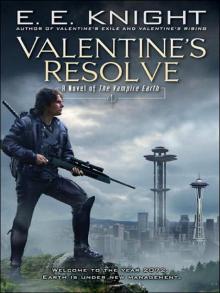 Valentine's Resolve
Valentine's Resolve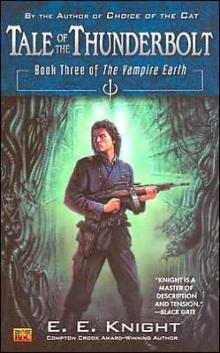 Tale of The Thunderbolt
Tale of The Thunderbolt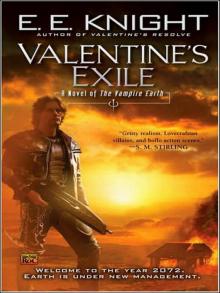 Valentine's Exile
Valentine's Exile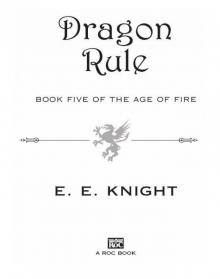 Dragon Rule
Dragon Rule Baltic Gambit: A Novel of the Vampire Earth
Baltic Gambit: A Novel of the Vampire Earth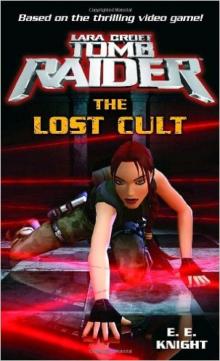 Lara Croft: Tomb Raider: The Lost Cult
Lara Croft: Tomb Raider: The Lost Cult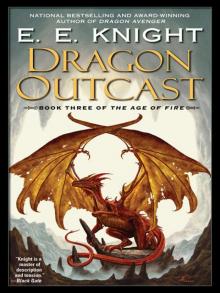 Dragon Outcast
Dragon Outcast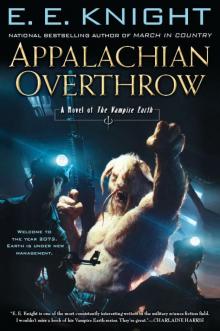 Appalachian Overthrow
Appalachian Overthrow Choice of the Cat
Choice of the Cat Dragon Champion
Dragon Champion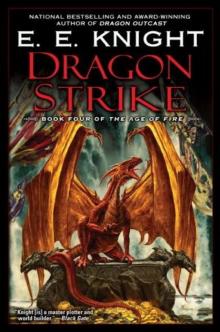 Dragon Strike
Dragon Strike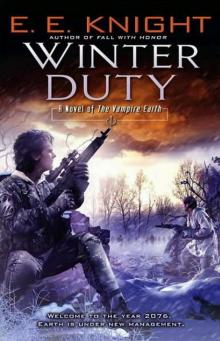 Winter Duty
Winter Duty Valentine's Rising
Valentine's Rising Baltic Gambit
Baltic Gambit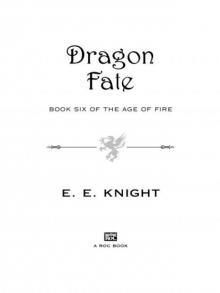 Dragon Fate: Book Six of The Age of Fire
Dragon Fate: Book Six of The Age of Fire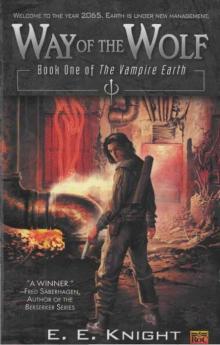 Way Of The Wolf
Way Of The Wolf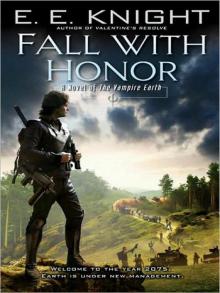 The Vampire Earth: Fall with Honor
The Vampire Earth: Fall with Honor